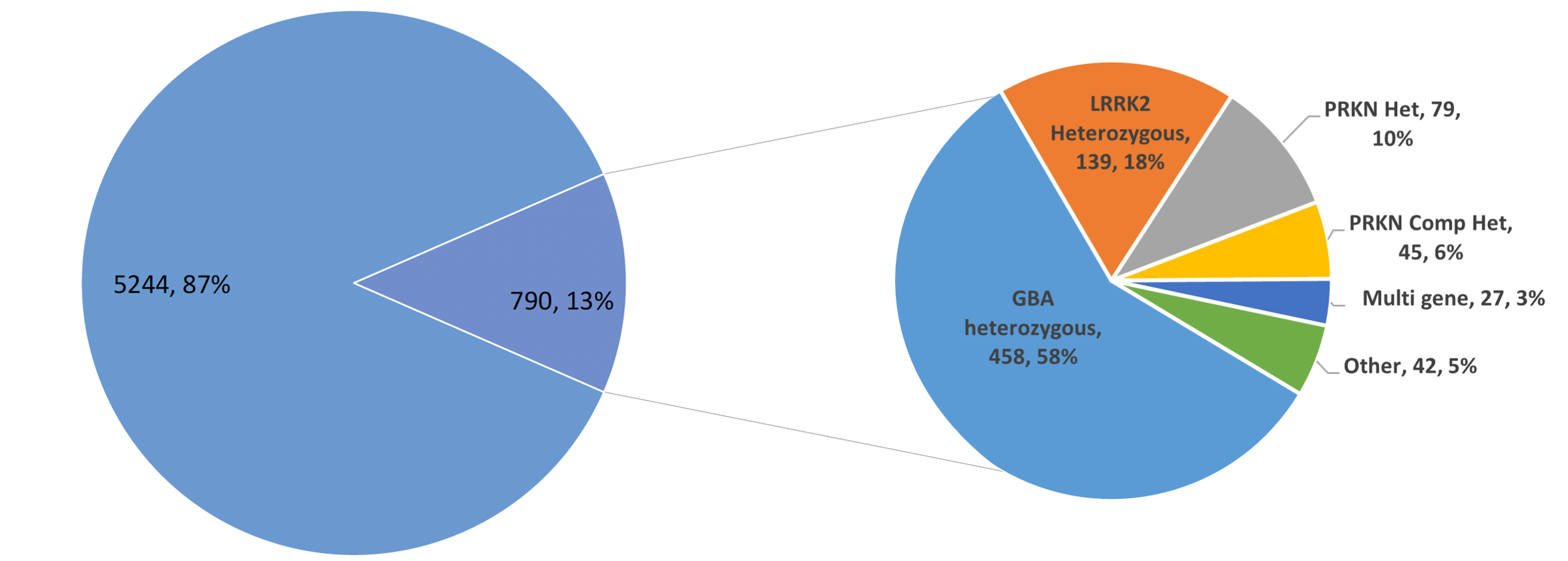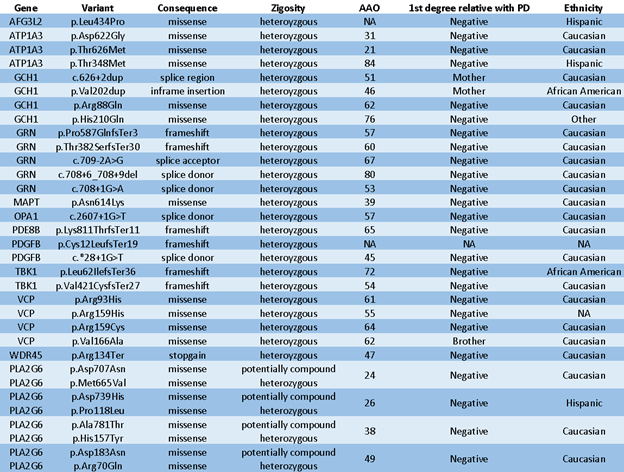Category: Parkinson's Disease: Genetics
Objective: To expand the analysis of whole-exome sequencing (WES) data from patients with Parkinson’s Disease (PD) from the PD GENEration cohort. We looked for variants in genes associated with rare forms of parkinsonism, beyond the panel containing the 7 classical PD genes that are routinely reported (GBA1, LRRK2, PARK7, PINK1, PRKN, SNCA, and VPS35).
Background: PD GENEration is a multi-center study that offers CLIA-certified genetic testing and counseling to PD patients in North America for 7 genes determined to have a primary role in causing PD. Overall, 13% of the participants carried pathogenic variants in one of these genes, with the majority being associated with GBA1 (8%, Figure 1). However, pathogenic variants in several other genes are associated with different forms of monogenic parkinsonism, which could cause a presentation mimicking PD.
Method: Clinical exome sequencing was performed at Fulgent Genetics, using the Illumina platform 2,500 HiSeq or NovaSeq 6,000. GATK version 4 was employed for alignment and variant calling. Variants were annotated with VEP v.105. We considered rare variants (minor allele frequency < 0.01). Pathogenicity was determined based on the American College of Medical Genetics (ACMG) criteria.
Results: We curated a panel of 66 additional genes that can cause parkinsonism (Table 1). Of a total of 6034 cases analyzed, 29 (0.48%) carried pathogenic variants in one of those genes (Table 2). In particular, frontotemporal dementia (FTD)-related genes were the most represented (12 patients – 1x MAPT, 5x GRN, 2x TBK1, 4x VCP1). The other mutated genes were GCH1 (n=4), ATP1A3 (n=3), OPA1 (n=1), AFG3L2 (n=1), PLA2G6 (n=4, phase unconfirmed), WDR45 (n=1), PDGFB (n=2), PDE8B (n=1). Three subjects (10.3%) reported a first-degree family member affected by PD (2 cases with GCH1 variants and 1 case with VCP variant). The median age at onset was 54.5 (range 21-84). The majority of the subjects were of Caucasian ethnicity (72.4%). Of the 33 variants identified, 13 (38.2%) were loss-of-function.
Conclusion: Overall, our study shows that pathogenic variants in a wide spectrum of genes associated with non-classical parkinsonism are found in a minority of patients clinically diagnosed with PD. The effort to collect detailed clinical information on the variant carriers is ongoing. Broader genetic studies, such as WES or WGS, may be necessary for cases that do not carry pathogenic variants in the 7 classical PD genes.
Pathogenic variants in the 7 classical PD genes
Panel of 66 non-classical PD genes
Pathogenic variants in non-classical PD genes
To cite this abstract in AMA style:
I. Keller Sarmiento, V. Pitz, C. Blauwendraat, Z. Fang, T. Tatiana Foroud, A. Hall, K. Marder, I. Mata, M. Nance, M. Schwarzchild, T. Simuni, A. Wills, S. Lawrence, K. Ghosh Galvelis, J. Beck, A. Naito, R. Alcalay, N. Mencacci. PD GENEration: a genetic analysis beyond the classical 7 Parkinson’s disease genes [abstract]. Mov Disord. 2024; 39 (suppl 1). https://www.mdsabstracts.org/abstract/pd-generation-a-genetic-analysis-beyond-the-classical-7-parkinsons-disease-genes/. Accessed January 16, 2026.« Back to 2024 International Congress
MDS Abstracts - https://www.mdsabstracts.org/abstract/pd-generation-a-genetic-analysis-beyond-the-classical-7-parkinsons-disease-genes/



